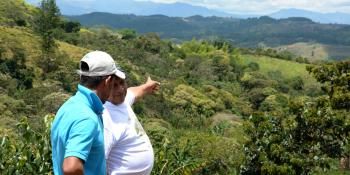Building the capacity of Cambodians on parliamentary climate diplomacy

Training parliamentary staff on climate diplomacy is the first step towards stronger national and regional climate legislation.
The Senate of Cambodia has enrolled 12 trainees to a ten-month program on Parliamentary Diplomacy focusing on the politics of climate change. This is one of the Senate’s strategies to train its staff on climate diplomacy and improve their knowledge and skills in monitoring the country’s national adaptation and mitigation strategies.
The training program was organized by the Parliamentary Institute of Cambodia (PIC), with the technical support of the CGIAR Research Program on Climate Change, Agriculture and Food Security (CCAFS) and the University of Utrecht. The organizers used CCAFS’ 'scenarios approach' which supports “building the capacity of parliamentary staff in their national and overseas functions, and in the long term, mainstreaming climate actions in government legislation,” explained Dr. Rathana Peou Norbert Munns, CCAFS Southeast Asia Regional Scenarios Coordinator and Policy Researcher.
Learning about climate change
Dr. Peou Norbert Munns explained that the training aimed to enhance the knowledge of participants on the science of climate change, its human and social dimensions, as well as relevant programs at the national and international level that address climate change impacts.
Through various activities, such as lectures, quizzes, case studies, debates, and games, the trainees were able to:
- learn about climate change and its observed and projected impacts;
- track and explain the international climate change policy framework, including the current negotiations under the United Nations Framework Convention on Climate Change (UNFCCC);
- define both climate change mitigation and adaptation;
- analyze international considerations for climate change decision-making;
- evaluate the key issues in the ongoing international climate change negotiations, including how to build and move forward from COP22, and prepare for COP23 and COP24;
- and understand key negotiating lines at the Southeast Asian level.
The feedback on the training program has been positive. For instance, Mr. Ly Sophea, member of the working group of International Affairs Research of the Department of Protocol and International Relations of the Senate of Cambodia, shared that it improved his confidence in discussing climate change impacts in Cambodia. The training unlocked his “potential to understand the role of parliaments in providing effective solutions to climate change impacts. Adaptation and mitigation strategies can also be strengthened by harmonizing international agreements with existing domestic laws and climate policies.”
Ms. Neuv Socheata, the training program coordinator, added that the participants identified and learned other useful skills such as note-taking, online and library research, and oral presentation to complement their increased knowledge on climate diplomacy.
Learning outcomes
“We learned how to look for accurate information on climate and put it together in [a] very concise manner that will be very useful for our senators,” said Mr. Somrach Oun, Chief Officer of the Senate’s International Affair Research Group under the International Relation and Protocol Department. Mr. Oun also mentioned that the training helped him prepare concept notes, briefing notes, speeches, resolutions, declarations, joint communiqués, and press releases, which will all be useful for the 27th Annual Meeting of Asia Pacific Parliamentary Forum (APPF) this year.
Aside from climate change-related knowledge, the participants learned the importance of understanding, responsibility, friendliness, humility, and confidence as elements of good leadership, according to Ms. Sok Leakhena, head of the working group of the International Affairs Research of the Senate of Cambodia.
Rooms for improvement
Overall, the participants expressed their satisfaction with the training. The majority of them rated it “excellent” and the amount of knowledge gained “very high”. To further improve the training, Mr. Somrach suggested to extend the training period to allow for more lessons; to involve staff from local governments, ministries, and related offices; and to focus more on the integration of all the different institutions that are involved in climate legislation. Dr. So Sovannarith, the Parliamentary Research Capacity Development Manager of PIC, added that the trainees would benefit from more training on effective briefing preparation, specifically on applying and interpreting descriptive statistics and writing and designing infographics.
Read more
- News update: Southeast Asian Parliamentary staff conducts climate change-related studies
- News update: CCAFS scenarios process informs Cambodia's climate action plans
- Blog: Future Scenarios work informs climate and agriculture policies in seven countries
Eisen Bernardo is the Senior Regional Communication Specialist of CCAFS Southeast Asia.



